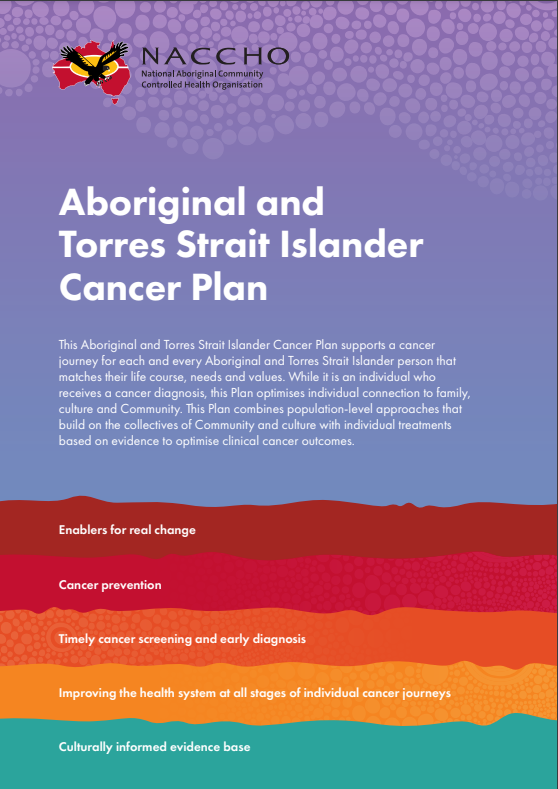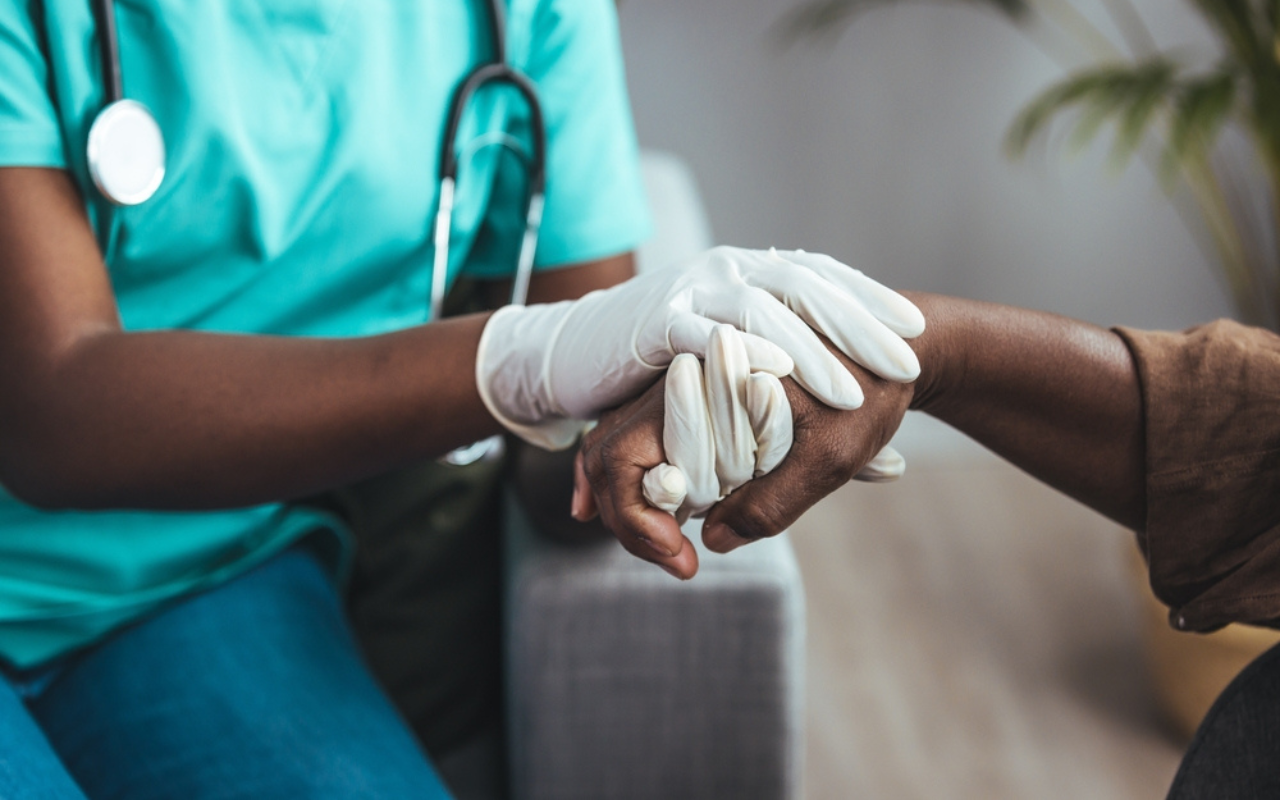The gap in cancer rates for Aboriginal and Torres Strait Islander peoples tripled between 2006 and 2019, while cancer rates fell for non-Indigenous Australians. InSight+ spoke with a medical oncologist and Aboriginal Hospital Liaison Officers about the new First Nations-led cancer plan to address the disparity.
According the National Aboriginal Community Controlled Organisation (NACCHO) Aboriginal and Torres Strait Islander Cancer Plan released this month, cancer is the leading cause of death among Aboriginal and Torres Strait Islander peoples.
The Plan also outlines that while cancer rates are falling in the wider population, the cancer gap tripled for First Nations people between 2016 and 2019.
In the Plan, NACCHO CEO Dr Dawn Casey identified twin areas of concern.
“Not only are Aboriginal and Torres Strait Islander peoples more likely to be diagnosed with cancer, but they are also likely to receive care that doesn’t meet their needs and have worse cancer outcomes,” wrote Dr Casey.
“This Plan begins our national journey towards the elimination of inequitable and avoidable differences between Aboriginal and Torres Strait Islander peoples and other Australians in cancer prevention, screening, treatment and supportive care.”

Researching the widening cancer gap
Dr Alice Bergin is a medical oncologist at the Peter MacCallum Cancer Centre and a PhD candidate exploring the impact of breast and lung cancer outcome disparities within Aboriginal and Torres Strait Islander populations.
Her work is supported by the Centre of Research Excellence in Targeted Approaches to Improve Cancer Services of Aboriginal and Torres Strait Islander Australians (TACTICS CRE) and the Peter MacCallum Cancer Centre Foundation.
“I’m very conscious of being a person of European background working in this space,” said Dr Bergin.
“I’m surrounded by incredibly generous Aboriginal and Torres Strait Islander health researchers who give me ongoing cultural guidance.
“In Australia, where we have access to universal health care, Aboriginal and Torres Strait Islander people are still 14% more likely to be diagnosed with any cancer, and relative five-year survival rates are 14% lower for people identifying as Aboriginal and Torres Strait Islander.”
“Aboriginal and Torres Islander people in Victoria are twice as likely to be diagnosed with cancer and three times more likely to die from cancer.”
“That gap is startling in Australia, where we apparently have readily accessible, universal health care. There’s a lot of work to be done to understand this gap and then also, what can we do about it right now?”
The NACCHO Plan within a wider cancer framework
The NACCHO Cancer Plan sits among several First Nations and non-First Nations-led policy documents to address cancer released this year, including:
- the National Aboriginal and Torres Strait Islander Health Plan from 2021 to 2031;
- the National Aboriginal and Torres Strait Islander Cancer Framework;
- the National Agreement on Closing the Gap from 2012 to 2019;
- Cancer Australia’s Australian Cancer Plan — one of this plan’s strategic objectives is achieving equity in cancer outcomes for Aboriginal and Torres Strait Islander peoples;
- Victorian Aboriginal Cancer strategy from 2023 to 2028, Victorian Aboriginal Community Controlled Health Organisation (VACCHO); and
- the marra ngarrgoo, marra goorri, the Victorian Aboriginal Health, Medical and Wellbeing Research Accord (VACCHO).
Aboriginal Community Controlled organisations identify themes
“There are some critically important, common themes within the policy documents from VACCHO and NACCHO. Those themes drive the research work that I do,” said Dr Bergin.
“The plans focuses on Aboriginal and Torres Strait Islander self-determination and on co-designing research projects with Aboriginal and Torres Strait Islander people. That embodies the important notion of ‘nothing about, us without us’.”
Dr Bergin said the plans outline the need for strong and supported Aboriginal and Torres Strait Islander workforce, greater access to wrap-around care, and recognising the cultural determinants of health at every stage of the cancer journey.
“There’s the need for a culturally safe and responsive health system that embodies an active shift towards antiracism,” said Dr Bergin.
First Nations statistics one of the first stumbling blocks
“In my work, early analysis shows that the statistical power of the project itself is limited by the lower than expected frequency of people identifying as Aboriginal and Torres Strait Islander in the health service,” said Dr Bergen.
“There are multiple reasons for this, but as is reflected in NACHCO Cancer Plan, a huge factor is the provision of culturally safe health services.”
Supporting First Nations patients with First Nations health care workforce
Ms Andrea Casey and Ms Jay Hamann both work as Aboriginal Hospital Liaison Officers at the Peter MacCallum Cancer Centre.
“The most important part of our role is having a presence for both our Aboriginal patients and for our staff here. There’s this sense of safety when you have another Aboriginal person, a liaison, in the hospital from the moment they step into the doors, all the way through their cancer experience,” said Ms Hamman.
Ms Casey said that the medical teams are very happy to have their support and value learning.
“We can also train staff. It’s about us making make sure they are as culturally safe as possible,” said Ms Casey.
“Jay, especially, is out and about all the time around the hospital. If anyone’s got a question about Aboriginal people, they’ll bail one of us up. And it’s really cool to know that people are that interested,” said Ms Casey.
Both Ms Casey and Ms Hamann say that they create trust, where mainstream health services have in the past created mistrust for Aboriginal and Torres Strait Islander patients.
“Through the years, there’s been lots of horrific racism in all mainstream services. That’s still in people’s minds, through word of mouth. Those incorrect judgments that Aboriginal people have carried for a long time — that we’re untrustworthy, or liars, or thieves or alcoholics,” said Ms Hamann.
“When Aboriginal people walk in the doors, they can be hypersensitive to these things. They might be really quiet and not ask questions because they don’t feel comfortable. We build rapport so they feel comfortable to ask questions and say, ‘Hey, I’m feeling pain. This isn’t working for me’,” said Ms Hamann.
The NACCHO Cancer Plan offers an invitation to mainstream health organisations to “reform themselves” and improve outcomes for First Nations peoples and cancer.
“There is no time to waste. Working together must start today,” wrote Dr Casey.
Subscribe to the free InSight+ weekly newsletter here. It is available to all readers, not just registered medical practitioners.

 more_vert
more_vert